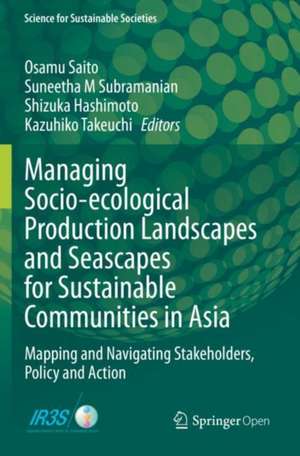Managing Socio-ecological Production Landscapes and Seascapes for Sustainable Communities in Asia: Mapping and Navigating Stakeholders, Policy and Action: Science for Sustainable Societies
Editat de Osamu Saito, Suneetha M Subramanian, Shizuka Hashimoto, Kazuhiko Takeuchien Limba Engleză Paperback – 18 sep 2020
This open access book presents up-to-date analyses of community-based approaches to sustainable resource management of SEPLS (socio-ecological production landscapes and seascapes) in areas where a harmonious relationship between the natural environment and the people who inhabit it is essential to ensure community and environmental well-being as well as to build resilience in the ecosystems that support this well-being. Understanding SEPLS and the forces of change that can weaken their resilience requires the integration of knowledge across a wide range of academic disciplines as well as from indigenous knowledge and experience. Moreover, given the wide variation in the socio-ecological makeup of SEPLS around the globe, as well as in their political and economic contexts, individual communities will be at the forefront of developing the measures appropriate for their unique circumstances. This in turn requires robust communication systems and broad participatory approaches.
Sustainability science (SuS) research is highly integrated, participatory and solutions driven, and as such is well suited to the study of SEPLS. Through case studies, literature reviews and SuS analyses, the book explores various approaches to stakeholder participation, policy development and appropriate action for the future of SEPLS. It provides communities, researchers and decision-makers at various levels with new tools and strategies for exploring scenarios and creating future visions for sustainable societies.
| Toate formatele și edițiile | Preț | Express |
|---|---|---|
| Paperback (1) | 348.54 lei 38-44 zile | |
| Springer Nature Singapore – 18 sep 2020 | 348.54 lei 38-44 zile | |
| Hardback (1) | 359.78 lei 38-44 zile | |
| Springer Nature Singapore – 11 feb 2020 | 359.78 lei 38-44 zile |
Preț: 348.54 lei
Nou
Puncte Express: 523
Preț estimativ în valută:
66.69€ • 69.81$ • 55.51£
66.69€ • 69.81$ • 55.51£
Carte tipărită la comandă
Livrare economică 26 martie-01 aprilie
Preluare comenzi: 021 569.72.76
Specificații
ISBN-13: 9789811511356
ISBN-10: 9811511357
Pagini: 179
Ilustrații: X, 179 p. 45 illus., 32 illus. in color.
Dimensiuni: 155 x 235 mm
Ediția:1st ed. 2020
Editura: Springer Nature Singapore
Colecția Springer
Seria Science for Sustainable Societies
Locul publicării:Singapore, Singapore
ISBN-10: 9811511357
Pagini: 179
Ilustrații: X, 179 p. 45 illus., 32 illus. in color.
Dimensiuni: 155 x 235 mm
Ediția:1st ed. 2020
Editura: Springer Nature Singapore
Colecția Springer
Seria Science for Sustainable Societies
Locul publicării:Singapore, Singapore
Cuprins
Chapter 1: Introduction: Socio-ecological Production Landscapes and Seascapes.- Chapter 2: Mapping the policy interventions on marine social-ecological systems: case study of Sekisei Lagoon, southwest Japan.- Chapter 3: How to engage tourists in invasive carp removal: Application of a discrete choice model.- Chapter 4: The Use of Backcasting to Promote Urban Transformation to Sustainability: The Case of Toyama City, Japan.- Chapter 5: Traditional Knowledge, Institutions, and Human Sociality in Sustainable Use and Conservation of Biodiversity of the Sundarbans of Bangladesh.- Chapter 6: Lessons learned from application of the “Indicators of Resilience in Socio-ecological Production Landscapes and Seascapes (SEPLS)” under the Satoyama Initiative.- Chapter 7: Place-based Solutions for Conservation and Restoration of Social-Ecological Production Landscapes and Seascapes in Asia.- Chapter 8: Managing Socio-ecological Production Landscapes and Seascapes for Sustainable Communities in Asia: Mapping and Navigating Stakeholders, Policy and Action.- Chapter 9: Synthesis: Managing Socio-ecological Production Landscapes and Seascapes for Sustainable Communities in Asia.
Notă biografică
Osamu Saito
Institution - United Nations University Institute for the Advanced Study of Sustainability (UNU-IAS)
Tokyo, Japan
Suneetha M Subramanian
United Nations University International Institute for Global Health
Kuala Lumpur, Malaysia
Shizuka Hashimoto
The University of Tokyo, Graduate School of Agriculture and Life Sciences
Tokyo, Japan
Kazuhiko Takeuchi
The University of Tokyo, Institute for Future Initiatives (IFI)
Tokyo, Japan
Institution - United Nations University Institute for the Advanced Study of Sustainability (UNU-IAS)
Tokyo, Japan
Suneetha M Subramanian
United Nations University International Institute for Global Health
Kuala Lumpur, Malaysia
Shizuka Hashimoto
The University of Tokyo, Graduate School of Agriculture and Life Sciences
Tokyo, Japan
Kazuhiko Takeuchi
The University of Tokyo, Institute for Future Initiatives (IFI)
Tokyo, Japan
Textul de pe ultima copertă
This open access book presents up-to-date analyses of community-based approaches to sustainable resource management of SEPLS (socio-ecological production landscapes and seascapes) in areas where a harmonious relationship between the natural environment and the people who inhabit it is essential to ensure community and environmental well-being as well as to build resilience in the ecosystems that support this well-being. Understanding SEPLS and the forces of change that can weaken their resilience requires the integration of knowledge across a wide range of academic disciplines as well as from indigenous knowledge and experience. Moreover, given the wide variation in the socio-ecological makeup of SEPLS around the globe, as well as in their political and economic contexts, individual communities will be at the forefront of developing the measures appropriate for their unique circumstances. This in turn requires robust communication systems and broad participatory approaches.
Sustainability science (SuS) research is highly integrated, participatory and solutions driven, and as such is well suited to the study of SEPLS. Through case studies, literature reviews and SuS analyses, the book explores various approaches to stakeholder participation, policy development and appropriate action for the future of SEPLS. It provides communities, researchers and decision-makers at various levels with new tools and strategies for exploring scenarios and creating future visions for sustainable societies.
Caracteristici
Generates useful knowledge and mapping (visualization) tools to aid local communities and decision-makers develop local solutions for local challenges Maps out the current research landscape surrounding this topic to identify research gaps, challenges, and success factors, with a view to strengthening future biodiversity-related science-policy-practice interfaces Presents an alternative understanding of the measures for sustainable utilization and conservation of resources by integrating indigenous and local knowledge (ILK) systems into both scientific knowledge and future scenarios through participatory approaches















